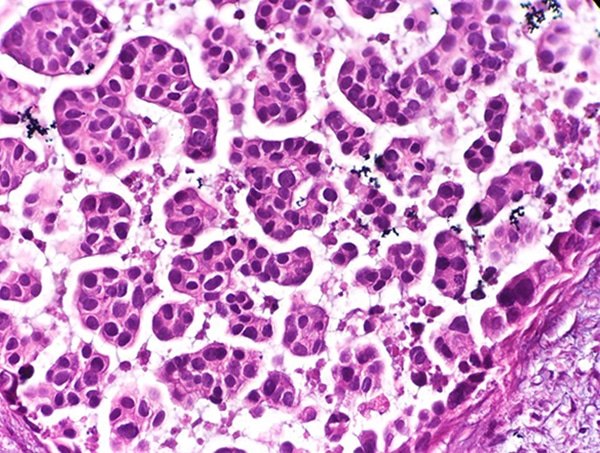Targeting Urothelial Carcinoma
The U.S. FDA approved an antibody-drug conjugate to treat urothelial cancer, the most common form of bladder cancer.
The U.S. Food and Drug Administration (FDA) approved the molecularly targeted therapeutic enfortumab vedotin-ejfv (Padcev) to treat certain patients with urothelial carcinoma, the most common form of bladder cancer.
Enfortumab vedotin-ejfv is an antibody-drug conjugate—a two-pronged treatment in which a potent drug is bound to an antibody that targets the drug specifically to cancer cells. In this case, the drug destabilizes part of the cell’s internal skeleton, and the antibody directs it to cells expressing a protein called nectin-4.

Research, including a study published in Cancer Research, a journal of the American Association for Cancer Research (AACR), has shown that up to 60 percent of bladder cancers are characterized by elevated levels of nectin-4. Moreover, research has found that enfortumab vedotin-ejfv causes tumor regression in preclinical models of bladder cancer.
The agency granted accelerated approval to the targeted therapeutic in December 2019. The full approval was based on an open-label, active-controlled clinical trial in which 608 patients were randomly assigned to treatment with enfortumab vedotin-ejfy or chemotherapy. The median overall survival was 12.9 months for patients treated with enfortumab vedotin-ejfy, compared with 9.0 months for patients treated with chemotherapy.
Enfortumab vedotin-ejfy is intended to treat adults with locally advanced or metastatic urothelial cancer that has progressed despite treatment with an immune checkpoint inhibitor and a platinum-containing chemotherapy regimen, or for patients ineligible for platinum-containing chemotherapy whose tumors progressed on at least one line of prior treatment.
Bladder cancer is expected to be diagnosed in nearly 84,000 people in the United States in 2021 making it the sixth most diagnosed type of cancer in the country.
The FDA decision was rendered on July 9, 2021.
